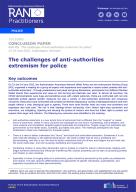Details
- Publication date
- 9 December 2022
- Author
- Directorate-General for Migration and Home Affairs
- Country
- Denmark
- RAN Publications Topic
- Multi-agency cooperation
Description
On 23 and 24 June 2022, the Radicalisation Awareness Network (RAN) Police and law enforcement Working Group (POL) organised a meeting for a group of experts with experience and expertise in recent violent protests and anti-authorities extremism . Through presentations and panel and group discussions, participants from different Member States shared their experiences and views on this burning and relatively new topic. In almost all countries, the COVID demonstrations were huge and sometimes even with violent outbursts. Police are confronted with not only legitimate protest against specific measures but also a variety of anti-authorities sentiments and conspiracy narratives. Most police were confronted with protest movements displaying a variety of ideological factions and even people without a clear ideological goal or agenda.
There were some familiar faces but many new protesters and organisers also took part. The risk is that ideology-driven extremists, from violent right-wing extremism and anarchism, are instigating, hijacking and abusing the protest of citizens who have the fullest right to protest and express their anger and criticism.
The following key outcomes were identified in the meeting:
- Anti-authorities extremism is a new hybrid form of extremism that is different from the “original” or classic forms of extremism. Police in many countries are challenged by new forms of protesting, new protesters, and more violence and intimidation targeted against authorities and institutions. Targets range from politicians and governments to the health sector, scientists, journalists and police. The meeting’s participants saw huge similarities in these new challenges for European police.
- There is a need to better understand this “blurry” and hybrid anti-authorities extremism. Sometimes it is not clear what the ideology or the political demands are. We need to better look at who is protesting and demonstrating, and who is not. We need to better understand what the drivers and triggers are and what role the social media play. And who is paying, facilitating and organising?
- Facilitating citizens in using their democratic right to protest is a task for police in democracies. Dealing with illegal extremist elements and influences interfering with citizens protesting can be seen as protecting protest and citizens in open societies.
- Especially in times of surging distrust in authorities, police should be perceived by the public as professional and neutral. This also requires differentiating the approaches of specific individuals, organisations, and segments of protest and mass demonstrations.
This paper presents the main conclusions of two days of presentations and lively group discussions. Since this was the first time RAN POL had a meeting on the complex phenomenon of mass protest in combination with antiauthorities sentiments and extremists, a large portion of the first day was spent on sharing experiences and understanding variety in the phenomenon. On the second day, the group drafted lessons and recommendations.

